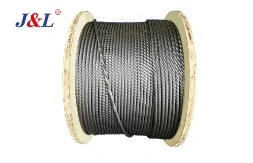What Are Certified Lifting Slings and Why Are They Essential for Safe Material Handling?
July 17, 2025
Especially in heavy lifting and rigging workplaces, security is of prime importance. During carrying out the task in construction, marine transportation, mining, and the manufacturing sectors, the equipment used should be robust, dependable, and adhere strictly to industry regulations. This is where the role of the certified lifting slings becomes imperative. However, what is the exactly to the term “certified,” and the significance of selecting the most suitable one like the wire rope galvanized and much more—synthetic slings?

What Are Certified Lifting Slings?
Certified lifting slings are no more than artifacts, such as wire ropes, chains, or synthetic fibers, that are checked for quality and approved by international or national safety organizations (for instance, EN, ASME, ISO). The marks of certification guarantee that without a doubt, the sling is capable of safely lifting the rated load without any problems when used correctly.
Safety slings are labeled with tags that carry information such as working load limits (WLL), material signs, sling types, and inspection history—details that assure the operator of their correct usage.
Why Certification Matters
The use of uncertified or worn slings can result in catastrophic equipment failure, injuries, and even fatalities. Certified slings:
- Meet safety compliance requirements in regulated industries
- Reduce legal and insurance risks for companies
- Increase confidence in high-load and overhead applications
- Allow for traceability and routine inspection
Juli Sling, a trusted manufacturer of lifting and rigging products, ensures that all its certified lifting slings exceed performance and durability expectations. Whether it’s a wire rope galvanized sling for rugged construction sites or a lightweight synthetic sling for precision lifting, each product is tested for maximum reliability.
Types of Lifting Slings and Their Applications
Choosing the right sling depends on your load type, environment, and lifting frequency. The most common types include:
- Wire Rope Galvanized Slings: Ideal for harsh environments due to their strength and corrosion resistance. These slings are often used in construction, offshore platforms, and industrial lifting.
- Synthetic Slings: Lightweight, flexible, and non-abrasive to delicate loads. Perfect for aerospace, glass, or machinery installation work.
- Chain Slings: High-strength and adjustable, suitable for heavy-duty and repetitive lifting operations.
Each material has unique advantages, but only when certified can they ensure consistent safety performance under stress.
Wire Rope Galvanized: Built for Tough Conditions
A popular choice for demanding lifting tasks, wire rope galvanized slings are composed of multiple strands of steel wire coated in zinc. The galvanization process provides superior rust and corrosion protection, extending sling life even in marine or industrial settings.
Juli Sling’s wire rope galvanized products undergo precision fabrication and rigorous testing, making them suitable for crane work, shipyards, and construction projects that demand reliable strength in all weather conditions.
Synthetic Slings: Light, Strong, and Versatile
For applications where load surface protection, weight reduction, and ease of handling are priorities, synthetic slings are often the preferred choice. Made from polyester or nylon, these slings offer excellent flexibility, are non-conductive, and absorb shock effectively.
Juli Sling provides a full range of synthetic slings with customized lengths, widths, and lifting capacities—all compliant with strict quality certifications to guarantee safety in sensitive environments.
Why Choose Juli Sling?
With decades of experience in rigging solutions, Juli Sling stands out as a leading provider of certified lifting slings. Their production processes meet international safety standards, and every product undergoes inspection, testing, and certification before shipment.
- Full product range: wire rope, chain, and synthetic
- ISO, CE, and third-party certifications
- Custom manufacturing for industry-specific needs
- Global shipping and technical support
